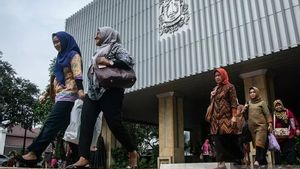JAKARTA - PT Manulife Aset Manajemen Indonesia (MAMI) sees that global economic conditions are still maintained amidst stock market corrections or debt securities.
Portfolio Manager Fixed Income MAMI Laras Febriany said the main trigger for weakening the bond market in April was higher United States (US) inflation data than expected. Where, general US inflation tends to increase in the period January to March 2024.
As a result, the Fed indicates it will still take longer to be sure that its domestic inflation is really in a downward trend, before cutting.
"This condition increases volatility in the stock market, bonds, and currencies globally, Asia, and Indonesia, which then encourages the market to adjust its expectations regarding interest rates," Laras said in a statement, Sunday, May 26.
But the latest good news, the Chairman of The Fed argued that although interest rates would not fall as quickly as previous market expectations, the potential for further increases was very small. Thus, the next step in the future is to cut interest rates.
Laras said the possibility of cutting interest rates could be understood because actually the majority of US inflationary components had eased, except for shelter components and transportation which were still quite high.
Amid the dynamic expectations of the benchmark interest rate, it is reflected in the International Monetary Fund (IMF) projecting that this year's global economy will grow by 3.2 percent.
Laras said the main support for global economic growth was the developing country area which was projected to grow 4.2 percent, followed by an area of developed countries that grew 1.7 percent.
"Interestingly, all of these figures are higher than the previous projections released last January, so recession concerns don't seem to be a scenario in the market," he explained.
According to Laras, optimism for growth is supported by a strong level of demand, more than sufficient pandemic era savings, and also the positive impact of government stimulus.
Laras said that the resilient economy also occurs in conjunction with the trend of disinflation, supported by the recovery of global supply chains, the availability of labor, and the decline in energy prices.
"But it's true, even though global inflation has stepped in, the world's central bank has not been able to lower interest rates, because it tends to wait for the Fed's move. The problem is, the Fed gives a signal that it will still take time to be even more sure that domestic inflation is really in a downward trend, before cutting," he added.
SEE ALSO:
Laras said that the second quarter of 2024 will indeed begin with changes in expectations, which are followed by high volatility and less conducive market sentiment. However, with time running, the market also made adjustments, the volatility seemed to subside, and sentiment began to recover.
Laras said that overall the global economy this year is expected to still grow, and global inflation is also in a downward trend. In Indonesia itself, economic fundamentals are still maintained strongly, and catalysts that support and potential financial markets are still very sufficient.
"Let's focus on long-term opportunities, and make short-term volatility an opportunity that doesn't necessarily come back, especially with a view of cutting interest rates that can still occur," said Laras.
Laras is optimistic about the debt securities market in line with the potential for future interest rate cuts. However, it is necessary to observe that in the short term volatility can still occur due to the Fed's interest rate uncertainty factor.
"Therefore, we always manage the portfolio actively, moving dynamically between defensive and aggressively to form an optimal portfolio," he said.
The English, Chinese, Japanese, Arabic, and French versions are automatically generated by the AI. So there may still be inaccuracies in translating, please always see Indonesian as our main language. (system supported by DigitalSiber.id)


















